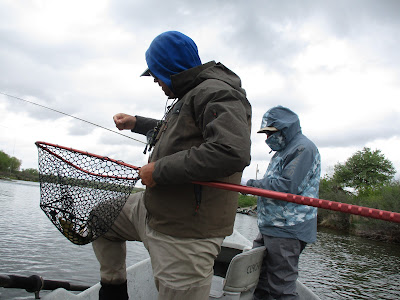Wednesday we floated the stretch from the dam all the way to
Bighorn Access.
The last couple of miles I was able to streamer fish.
This was great looking water but, as the
guide said, it was just too cold of water for the fish to be interested in
chasing a streamer.
It rained hard for about a half hour in the afternoon and
we could see one of the feeder streams muddying up the right side of the
river.
Because of this, on Thursday we
floated the first 3 miles below the Yellowtail Dam twice.

We stopped and fished one stretch of river,
which is particularly good for wading.
I
caught a couple nice trout and then Ron caught a swallow.
It wasn’t known if
the swallow was going for the nymph during the cast or if it got caught in the
line.
Scott was able to unwrap the line
tangled around the bird and then take out the fly.
He and Ron placed the bird on shore in the
grass and kept an eye on it until it wasn’t there anymore and must have flown
away.
This was a great river for bird
watchers.
Ron was able to find two species he had never seen before.
The river was noticeably less crowded the second float
through in the afternoon.
Scott noticed
risers in the afternoon and had me cast to those.
This was probably the most fun part of the
week for me. I caught both risers right off the bat.
It had been a year since I had fished a dry
fly and this gave me a sense of accomplishment, that I had not lost my touch.
On Friday, we planned to float the entire 13 miles from the
dam to Bighorn Access.
We started
catching a few trout on nymphs but at lunchtime, Scott noticed risers in the
calm water just before the 3-mile access.
We decided to take turns fishing dries while the other ate lunch. The good dry fly fishing continued until it
was late in the afternoon.
Scott texted the shuttle company and had them move the
truck to the takeout at 3-mile access. Excellent dry fly fishing was a great
way to end the week.
Overall, we ended up catching 10 to 15 trout (rainbows and
browns) each per day between 14 and 20 inches long with many in the 18 to 19
inch range.
The more overcast the day, the better the fishing.
We caught five species of fish, including
suckers and white fish.
Something I
learned was that suckers have a slime that gets on anything it touches.
You
have to physically scrape the slime off if it gets on the leader.
It will not just dissolve or come off in the
water. There is also a lot of moss in
the river. One method to remove it from
your flies is performing the “Bighorn Slap”.
This is where you twirl your line in the air and cause the flies with
the moss to hit the water several times, thus removing the moss.
The guide, Scott, showed us all the aspects of an excellent
guide.
Super experienced on this
specific river and understanding all the nuances the river and fish go through.
He was very personable and a joy to spend time with, even able to discuss bird
species with Ron.
Besides being
knowledgeable, he was always willing to try something different and continue to
change flies.
He put in extra effort by
continuing to put in one more row back up the run and pass back through even if
it was after 4:30 and cold and windy.
You could tell he was genuinely interested in us catching fish.
All in all, this was a great trip that I would highly
recommend.




















































